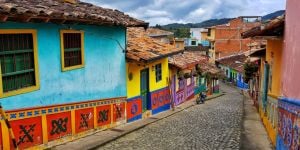Cartagena de Indias
Colombia's number one holiday resort.
Since it was founded in 1533, by the Spanish conquistador Don Pedro de Heredia, Cartagena has been an important port on the Caribbean.
Once Cartagena was one of the chief ports of the Spanish treasure fleet, having been absorbed as part of the Spanish Main. Gold and silver often left this port bound for destinations in Europe.
This made it a prime target for pirates and buccaneers from many countries who were at odds with the Spanish (especially England and France), they would often lay in wait in the vicinity, looking for bounty, or ransacking the city. A walled fort was eventually built to protect both shipping and the lucrative slave trade.
Today with a population of just over a million, this lovely city is drenched in sunshine and steeped in history. It is also Colombia's premier holiday destination, the place where Colombians come to unwind. Over recent years the more adventurous holidaymakers from the US and many European countries are discovering the delights of this lovely holiday destination. This has meant that annually for several years now, the tourism industry has been steadily growing.
There are plenty of hotels to choose from in Cartagena, ranging from modest 3 star equvalent hotels to 5 star luxury hotels, rivalling those found in much larger cities around the world.
The climate here is hot and quite equable due to Cartagena's tropical location, varying between an average high of 31 °C (88 °F) and an average low of 24 °C (75 °F) yearly.
Cartagena also averages around 80% humidity, with the rainy season usually coming around October. The average rainfall per year being about 1000 mm (40 inches).
Cartagena is filled with the sounds of Latin or Caribbean music and has become a mecca for tourists, who visit the city to enjoy the history, sights, weather and night life. Ideally, a trip to Caragena should span several days or preferably a week, to properly enjoy Cartagena's colonial charm. Not to be missed is the old walled city - the Ciudad Amurullada, with it's tiled roofs, balconies and flower-filled courtyards. These all beckon visitors to wander down the narrow streets. One interesting event each day is when the local fishermen take out their nets to sea in a boat, laying them in a massive arc. at the signal the locals (and tourists (if they feel inclined) all give a hand to haul the nets in. The catch can be quite varied, and whilst we were there, included the spotted ray in the small picture on the left.
For the traveller with a gastronomic bent, Cartagena also boasts many good restaurants serving a wide range of excellent, mouth-watering international cuisine at prices that will suit all pockets.
The food in the various restaurants that we tried was both inexpensive and delicious. One of these was a French one, serving a three course table d'hote evening menu that worked out at about £5 per head. On another occasion, we dined at a restaurant serving local dishes, their speciality like so many of Cartagena's restaurants, was seafood which was delicious. There is plenty to do during the balmy evenings in Cartagena, with bars often providing tables and chairs where patrons can drink whilst watching various forms of open-air entertainment including caribbean dance troups, such as the one pictured above.
Wine lovers visiting Colombia do not get such a good deal however as all wine is imported and therefore only a little cheaper than here in the U.K. Cerveza or beer in English, is only 25p a bottle and generally more often drunk by Colombians when eating out, or at family get togethers (which happen much more frequently than the do here in the U.K).
A great evenings entertaiment can be enjoyed by booking a trip on one of the many Chiva buses that ply back and forth picking up passengers at recognised stops including hotels, or even inviting likely looking tourists to come aboard. Once the bus is full, passengers are treated to a unique evening of music and singing provided by local musicians, to which everyone joins in. To help lossen everyone up, each bench seat has a bottle of rum
or Aguardiente which is shared by the passengers on that seat. After driving around Cartagena for a while, the Chiva bus pulls up on the sandy beach, where the passengers can help themselves to local hot pasty-like snacks.
The islands
Cartagena, being a port, offers a wide range of boat trips to various destinations including some of the many nearby islands. One of the highlights of a holiday to Cartagena must be a package holiday trip of three days to Isla Palma.
High speed launches are used and once clear of the harbour, the skipper, seated high above the passengers will gun the engines and within a few seconds, the bows lift high into the air.
After just over half an hour of travelling at high speed, the launch will arrive at a stopover island and the passengers are welcomed by native fishermen who supplied everyone with delicious freshly caught crayfish, accompanied by coconut juice drunk with a straw straight from the freshly cut coconut husk
Here one can enjoy several hours break, during which an option is to go snorkling out to the reef. To get to the shallow water of the reef, it is necessary to cross about half a mile a mile of open water that is over 20 feet deep. Once at the reef, it is wonderful to see some of the fish normally kept in an aquarium here in their natural environment.
After this break, passengers then make their way back to the jetty where the launch was moored. They then board for the final journey to Isla Palma, one of the main holiday destinations. (The Colombian government has long been fighting to clear Colombia of narco-traffickers, and this island was confiscated from one of these and after his encarceration, was turned into a wonderful tourist resort)
The long pier leading to the island's enormous thatched hotel even has a swimming pool built in, whilst at the far end, is a spot where tame dolphins come to be stroked.
There is plenty to do here for short periods, with various water sports available. On the second day, the services of a local fisherman can be hired, who for a couple of pounds twill take holidaymakers out fishing in a dugout canoe. Another feature of the island is a raised walkway that meanders right through the Mangrove swamps. These tidal swamps were home to flocks of beautiful flamingos and other wading birds. Again, it is wonderful to see flamingos in their natural environment first hand.
Three days or so spent in this wonderful tropical paradise is the 'icing on the cake'and will complete a delightful holiday sampling what Cartagena has to offer the more adventurous holidaymaker.
We do our best to provide accurate and up to date information. However, if you have noticed any inaccuracies in this article, please let us know in the comments section below.






